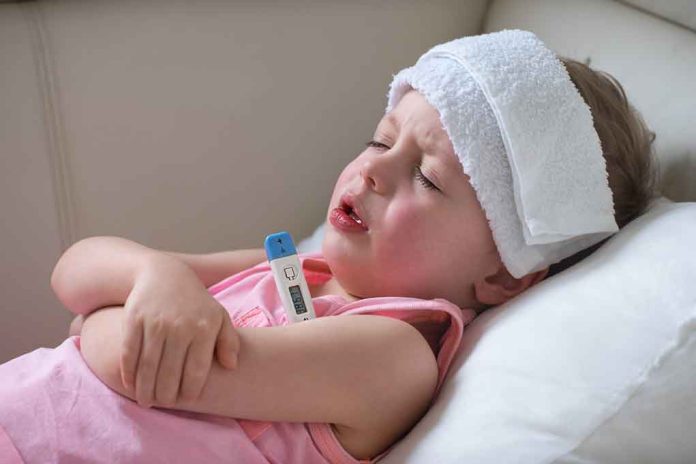
As American families prepare for the back-to-school season, the Centers for Disease Control and Prevention (CDC) sounds the alarm on a rising threat to our children’s health: parvovirus B19.
At a Glance
- CDC reports significant increase in parvovirus B19 cases among children aged 5-9
- Virus causes “slapped cheek” rash and can be serious for pregnant women and those with weak immune systems
- No vaccine available; CDC urges enhanced hygiene practices in schools and daycares
- Similar spike reported in 14 European countries earlier this year
A Growing Threat to Our Children
As patriotic Americans, we’ve always prided ourselves on our ability to protect our families and communities. But now, a new challenge emerges from an unexpected source. The CDC has issued a health alert about a highly contagious respiratory illness, parvovirus B19, which is particularly affecting our young children.
This virus, best known for causing fifth disease, has seen a dramatic increase in cases among children aged 5 to 9. Alarmingly, positive cases have risen from 15% to 40% between 2022 and June 2024. This isn’t just a minor uptick; it’s a significant leap that demands our attention.
The “Slapped Cheek” Virus
Parvovirus B19 earned its nickname due to the distinctive red rash it causes on children’s cheeks, giving them a “slapped cheek” appearance. But don’t be fooled by its seemingly innocuous name. This virus can pack a serious punch, especially for our most vulnerable.
“Most people require only supportive care during the acute phase of illness and will recover completely. Severe outcomes from parvovirus B19 disease, such as myocarditis, hepatitis, or encephalitis, are rare,” the CDC explained, while noting that there isn’t a vaccine for the virus.
While most children recover with supportive care, the virus poses a significant threat to pregnant women, potentially causing severe fetal anemia and even pregnancy loss. It’s also dangerous for those with compromised immune systems or chronic blood disorders. As responsible citizens, we must be vigilant in protecting these vulnerable groups.
A Global Concern
This isn’t just an American problem. Earlier this year, 14 European countries, including France, Spain, and Germany, reported similar spikes in parvovirus B19 cases. This global trend underscores the need for heightened awareness and action.
Which workers does @CDCemergency's Parvovirus B19 warning apply to?
Advisory does say that:
"Historically, people working in schools and in close contact with children (e.g., daycare workers and teachers) have had high occupational risk of infection."https://t.co/7GRNU2NCj3 pic.twitter.com/qP0uSFPcEX
— Alexander Tin (@Alexander_Tin) August 13, 2024
Taking Action: What We Can Do
In the absence of a vaccine, our best defense is prevention. The CDC is urging schools and daycares to implement enhanced hygiene practices and close monitoring. As parents and community members, we can support these efforts by teaching our children proper hand-washing techniques and encouraging them to practice good respiratory hygiene.
Healthcare providers are being called upon to be more vigilant in diagnosing and managing the virus, especially in high-risk groups. If you or your child experience symptoms such as fever, headache, sore throat, or the telltale “slapped cheek” rash, don’t hesitate to seek medical attention.
A Call to Patriotic Action
As Americans, we’ve faced numerous challenges throughout our history, and we’ve always emerged stronger. This latest health threat is no different. By working together, following CDC guidelines, and looking out for one another, we can protect our children, our families, and our communities from the spread of parvovirus B19.
Let’s show the world once again that American resilience and community spirit are our greatest weapons against any threat, big or small. Together, we can keep our children safe and healthy, ensuring a brighter future for the next generation of proud Americans.







